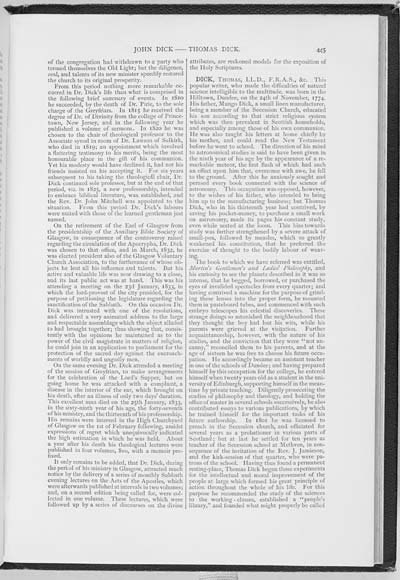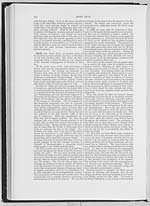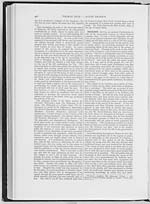445
of the congregation had withdrawn to a party who
termed themselves the Old Light; but the diligence,
zeal, and talents of its new minister speedily restored
the church to its original prosperity.
From this period nothing more remarkable oc-
curred in Dr. Dick's life than what is comprised in
the following brief summary of events. In 1810
he succeeded, by the death of Dr. Pirie, to the sole
charge of the Greyfriars. In 1815 he received the
degree of Dr. of Divinity from the college of Prince-
town, New Jersey, and in the following year he
published a volume of sermons. In 1820 he was
chosen to the chair of theological professor to the
Associate synod in room of Dr. Lawson of Selkirk,
who died in 1819; an appointment which involved
a flattering testimony to his merits, being the most
honourable place in the gift of his communion.
Yet his modesty would have declined it, had not his
friends insisted on his accepting it. For six years
subsequent to his taking the theological chair, Dr.
Dick continued sole professor, but at the end of that
period, viz. in 1825, a new professorship, intended
to embrace biblical literature, was established, and
the Rev. Dr. John Mitchell was appointed to the
situation. From this period Dr. Dick's labours
were united with those of the learned gentleman just
named.
On the retirement of the Earl of Glasgow from
the presidentship of the Auxiliary Bible Society of
Glasgow, in consequence of the controversy raised
regarding the circulation of the Apocrypha, Dr. Dick
was chosen to that office, and in March, 1832, he
was elected president also of the Glasgow Voluntary
Church Association, to the furtherance of whose ob-
jects he lent all his influence and talents. But his
active and valuable life was now drawing to a close,
and its last public act was at hand. This was his
attending a meeting on the 23d January, 1833, in
which the lord-provost of the city presided, for the
purpose of petitioning the legislature regarding the
sanctification of the Sabbath. On this occasion Dr.
Dick was intrusted with one of the resolutions,
and delivered a very animated address to the large
and respectable assemblage which the object alluded
to had brought together; thus showing that, consis-
tently with the opinions he maintained as to the
power of the civil magistrate in matters of religion,
he could join in an application to parliament for the
protection of the sacred day against the encroach-
ments of worldly and ungodly men.
On the same evening Dr. Dick attended a meeting
of the session of Greyfriars, to make arrangements
for the celebration of the Lord's Supper, but on
going home he was attacked with a complaint, a
disease in the interior of the ear, which brought on
his death, after an illness of only two days' duration.
This excellent man died on the 25th January, 1833,
in the sixty-ninth year of his age, the forty-seventh
of his ministry, and the thirteenth of his professorship.
His remains were interred in the High Churchyard
of Glasgow on the 1st of February following, amidst
expressions of regret which unequivocally indicated
the high estimation in which he was held. About
a year after his death his theological lectures were
published in four volumes, 8vo, with a memoir pre-
fixed.
It only remains to be added, that Dr. Dick, during
the period of his ministry in Glasgow, attracted much
notice by the delivery of a series of monthly Sabbath
evening lectures on the Acts of the Apostles, which
were afterwards published at intervals in two volumes;
and, on a second edition being called for, were col-
lected in one volume. These lectures, which were
followed up by a series of discourses on the divine
attributes, are reckoned models for the exposition of
the Holy Scriptures.
DICK, THOMAS, LL.D., F.R.A.S., &c. This
popular writer, who made the difficulties of natural
science intelligible to the multitude, was born in the
Hilltown, Dundee, on the 24th of November, 1774.
His father, Mungo Dick, a small linen manufacturer,
being a member of the Secession Church, educated
his son according to that strict religious system
which was then prevalent in Scottish households,
and especially among those of his own communion.
He was also taught his letters at home chiefly by
his mother, and could read the New Testament
before he went to school. The direction of his mind
to astronomical studies is said to have been given in
the ninth year of his age by the appearance of a re-
markable meteor, the first flash of which had such
an effect upon him that, overcome with awe, he fell
to the ground. After this he anxiously sought and
perused every book connected with the science of
astronomy. This occupation was opposed, however,
to the wishes of his father, who intended to bring
him up to the manufacturing business; but Thomas
Dick, who in his thirteenth year had contrived, by
saving his pocket-money, to purchase a small work
on astronomy, made its pages his constant study,
even while seated at the loom. This bias towards
study was further strengthened by a severe attack of
small-pox, followed by measles, which so greatly
weakened his constitution, that he preferred the
exercise of thought to the bodily labour of weav-
ing.
The book to which we have referred was entitled,
Martin's Gentlemen's and Ladies' Philosophy, and
his curiosity to see the planets described in it was so
intense, that he begged, borrowed, or purchased the
eyes of invalided spectacles from every quarter; and
having contrived a machine for the purpose of grind-
ing these lenses into the proper form, he mounted
them in pasteboard tubes, and commenced with such
embryo telescopes his celestial discoveries. These
strange doings so astonished the neighbourhood that
they thought the boy had lost his wits, while his
parents were grieved at the visitation. Further
acquaintanceship, however, with the nature of his
studies, and the conviction that they were "not un-
canny," reconciled them to his parents, and at the
age of sixteen he was free to choose his future occu-
pation. He accordingly became an assistant teacher
in one of the schools of Dundee; and having prepared
himself by this occupation for the college, he entered
himself when twenty years old as a student in the uni-
versity of Edinburgh, supporting himself in the mean-
time by private teaching. Diligently prosecuting the
studies of philosophy and theology, and holding the
office of master in several schools successively, he also
contributed essays to various publications, by which
he trained himself for the important tasks of his
future authorship. In 1801 he was licensed to
preach in the Secession church, and officiated for
several years as a probationer in various parts of
Scotland; but at last he settled for ten years as
teacher of the Secession school at Methven, in con-
sequence of the invitation of the Rev. J. Jamieson,
and the kirk-session of that quarter, who were pa-
trons of the school. Having thus found a permanent
resting-place, Thomas Dick began those experiments
for the intellectual and moral improvement of the
people at large which formed his great principle of
action throughout the whole of his life. For this
purpose he recommended the study of the sciences
to the working - classes, established a "people's
library," and founded what might properly be called

![]() Universal Viewer |
Universal Viewer | ![]() Mirador |
Large image | Transcription
Mirador |
Large image | Transcription
![]()

